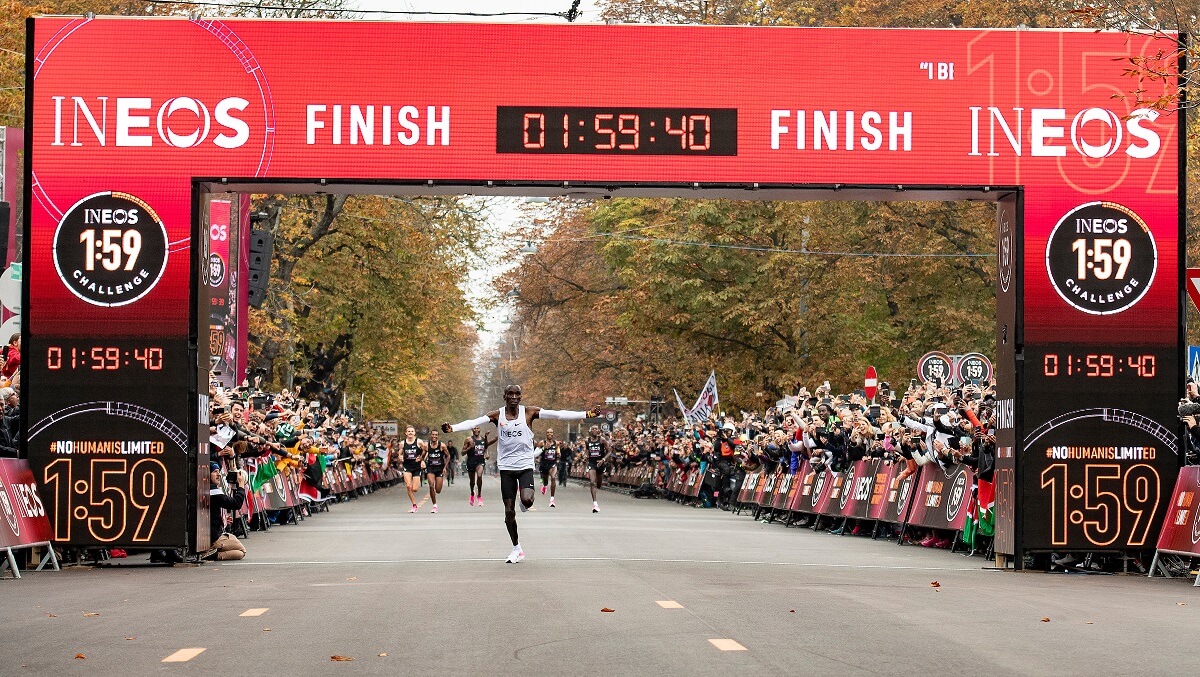In one of our past articles, we already described in great detail what a typical training week looks like for the world's fastest marathon runner.
Eliud Kipchoge ran a marathon world record in Berlin in the fall of 2018 with a time of 2:01:39 hours, and a year later he became the first person in the world to achieve a marathon time under two hours with 1:59:40.2 hours at the INEOS 1:59 Challenge in Vienna under conditions that were not suitable for a record.
It is obvious that the whole world is interested in how the Kenyan trains. You can find our excerpt of his training plan here: This is how Eliud Kipchoge trains for the INEOS 1:59 Marathon Challenge!
Intervals with Eliud Kipchoge
Now let's take a look at another aspect of Kipchoge's training, who always emphasizes that consistency in training is the key to success. That is, Kipchoge rarely experiments or tries something new in training. But we already covered this topic in our first article on Kipchoge training anyway.
This article focuses on the interval units, which the American portal sweatelite had described in more detail. Mostly Kipchoge does eight different units per month on the track, some he even repeats a second time within a month.
Tempo units of Eliud Kipchoge
These are three typical track workouts.
1) 15 x 1,000 meters PROGRESSIVE - 90 seconds rest
1,000 meter intervals are nothing special, of course. But things get really interesting when you take a closer look at the Kenyan's training.
Eliud Kipchoge starts the first 1,000 with a pace of 2:55 - 3:00 minutes per kilometer, which is about marathon pace or even a bit slower. After that he increases to 2:42 - 2:45 minutes per kilometer, so about ten seconds faster than the marathon pace. Now and then he runs one or two intervals at the end in 2:35 minutes. He averages 2:50 - 2:53 minutes per kilometer. Thus he runs a pace in the range of his marathon records (2:50 min/km = 1:59:40 hours "unofficial best" of Kipchoge).
Many amateur runners should also integrate this training example into their marathon training. On the one hand, Kipchoge reaches a pace that is if then only minimally above marathon pace, on the other hand, he starts slowly and increases as the training progresses without completely exhausting himself.
2) 12 x 1,200 meters PROGRESSIVE - 90 seconds rest
Similar interval training, same game. Kipchoge starts with a pace of 2:55 - 3:00 minutes per kilometer and increases to 2:45 minutes per kilometer.
3) 5 x (2 km + 200 m jog + 1 km) - 2 minutes series break.
Kipchoge runs two kilometers fast, then trots 200 meters before running another kilometer fast. After a two-minute break, he repeats this procedure four times. This means that the world record holder runs a total of 15 kilometers fast, which is similar to the first two examples. Here, too, he starts more slowly. He completes the first 2-kilometer run in 2:55 minutes per kilometer, then increases to 2:52 minutes per kilometer. He progressively covers the 1-kilometer runs in 2:50 to 2:40 minutes.
Note: Eliud Kipchoge trains at an altitude of over 2,000 meters and on unpaved tartan tracks. According to scientists, the time loss due to altitude is 3 seconds per kilometer, with another 2 seconds added due to the less good running track. However, this disadvantage becomes an advantage for Kipchoge and the other African runners in city marathons outside Africa, as the athletes were used to worse terrain and then run more light-footed on the firm and "unaccustomed" good terrain.
These three training sessions of Eliud Kipchoge prove once again that the training of the African is anything but a complex science. Rather, the training shows that you can be highly successful with simple but effective running units.
More Marathon: The 25 most beautiful marathons in the world








Kommentar schreiben